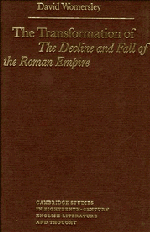Book contents
- Frontmatter
- Contents
- Acknowledgements
- A note on references and quotations
- Introduction
- PART I The historiography milieu
- PART II The Decline and Fall of the Roman Empire
- 3 Introduction
- Volume 1 - 1776
- Gibbon among the philosophers
- Volumes II and III - 1781
- 9 ‘The more rational ignorance of the man’
- 10 Julian the Apostate
- 11 Ammianus Marcellinus
- 12 ‘The nice and secret springs of action’
- Volumes IV, V and VI - 1788
- Appendix
- Bibliography
- Index
9 - ‘The more rational ignorance of the man’
Published online by Cambridge University Press: 05 September 2013
- Frontmatter
- Contents
- Acknowledgements
- A note on references and quotations
- Introduction
- PART I The historiography milieu
- PART II The Decline and Fall of the Roman Empire
- 3 Introduction
- Volume 1 - 1776
- Gibbon among the philosophers
- Volumes II and III - 1781
- 9 ‘The more rational ignorance of the man’
- 10 Julian the Apostate
- 11 Ammianus Marcellinus
- 12 ‘The nice and secret springs of action’
- Volumes IV, V and VI - 1788
- Appendix
- Bibliography
- Index
Summary
With a fine sense of the piquant, Gibbon chose as the epigraph for Volume I of The Decline and Fall a quotation from the historian who had recounted the foundation and prodigious growth of the Roman state:
Jam provideo animo, velut qui, proximis littori vadis inducti, mare pedibus ingrediuntur, quicquid progredior, in vastiorem me altitudinem, ad velut profundum invehi; et crescere pene opus, quod prima quaeque perficiendo minui videbatur.
There is, of course, a becoming modesty in an author's confessing his inadequacy before the majesty of his subject. Nevertheless, the controlled shapeliness of Volume I is so striking that it cannot but seem surprising to have this indication of overwhelming immensity standing at its head. Nowhere is Gibbon less at sea than in the first volume of his history.
An historian may encounter different kinds of difficulty. On the one hand, he may feel burdened by a mass of meaningless particularity from which nothing of value can be extracted, and for which he feels little sympathy; a philosophic historian (if Gibbon has rightly taken the measure of the man in ‘Sur la Monarchic des Mèdes’) will be especially liable to this, because he will have such a well-defined idea of what it is he has to say. On the other hand, the historian may feel oppressed by evidence too weighty and plentiful for him to dismiss as meaningless, and yet determinedly resistant to his efforts to read and understand it.
- Type
- Chapter
- Information
- The Transformation of The Decline and Fall of the Roman Empire , pp. 145 - 155Publisher: Cambridge University PressPrint publication year: 1988

